Management Skills: Analysis of Mr. Johnson's Case and Solutions
VerifiedAdded on 2022/11/13
|17
|4830
|9
Report
AI Summary
This report analyzes a case study involving Mr. Mark Johnson, newly appointed as Plant Manager for an Australian appliance company. The study delves into the management challenges Johnson faces, including motivating employees, navigating power dynamics, and resolving conflicts. It examines key management concepts such as motivation theories (Herzberg’s Two Factors, Maslow’s Hierarchy), power structures (legitimate, expert, referent, reward, coercive), and conflict resolution strategies. The report recommends strategies for Johnson, emphasizing the importance of developing a goal-oriented professional development program, fostering employee motivation, understanding power dynamics, and managing conflicts effectively. The analysis draws upon management theories to provide practical solutions and actionable insights for improving leadership skills and addressing workplace challenges within the context of the Australian Appliance Company.
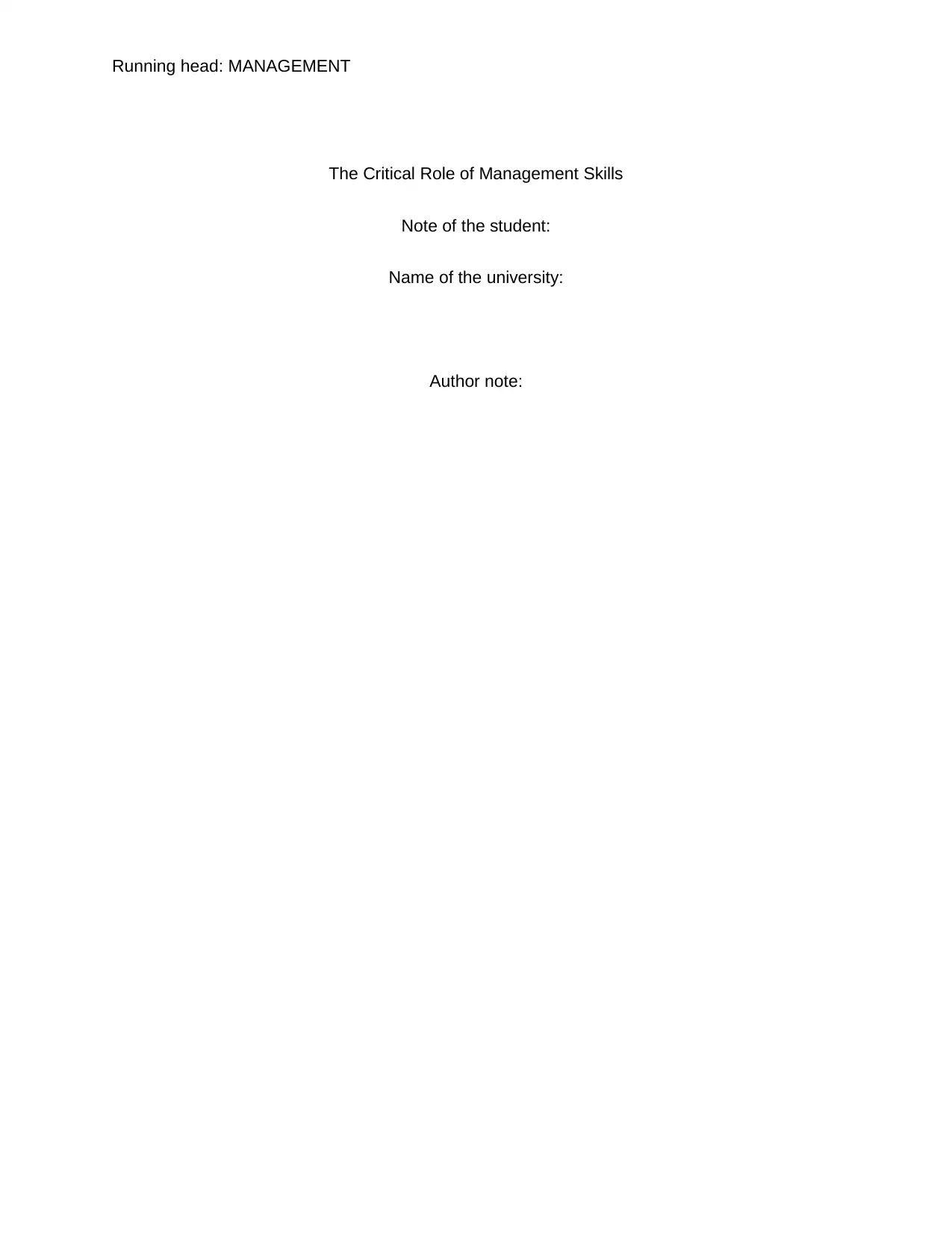
Running head: MANAGEMENT
The Critical Role of Management Skills
Note of the student:
Name of the university:
Author note:
The Critical Role of Management Skills
Note of the student:
Name of the university:
Author note:
Paraphrase This Document
Need a fresh take? Get an instant paraphrase of this document with our AI Paraphraser
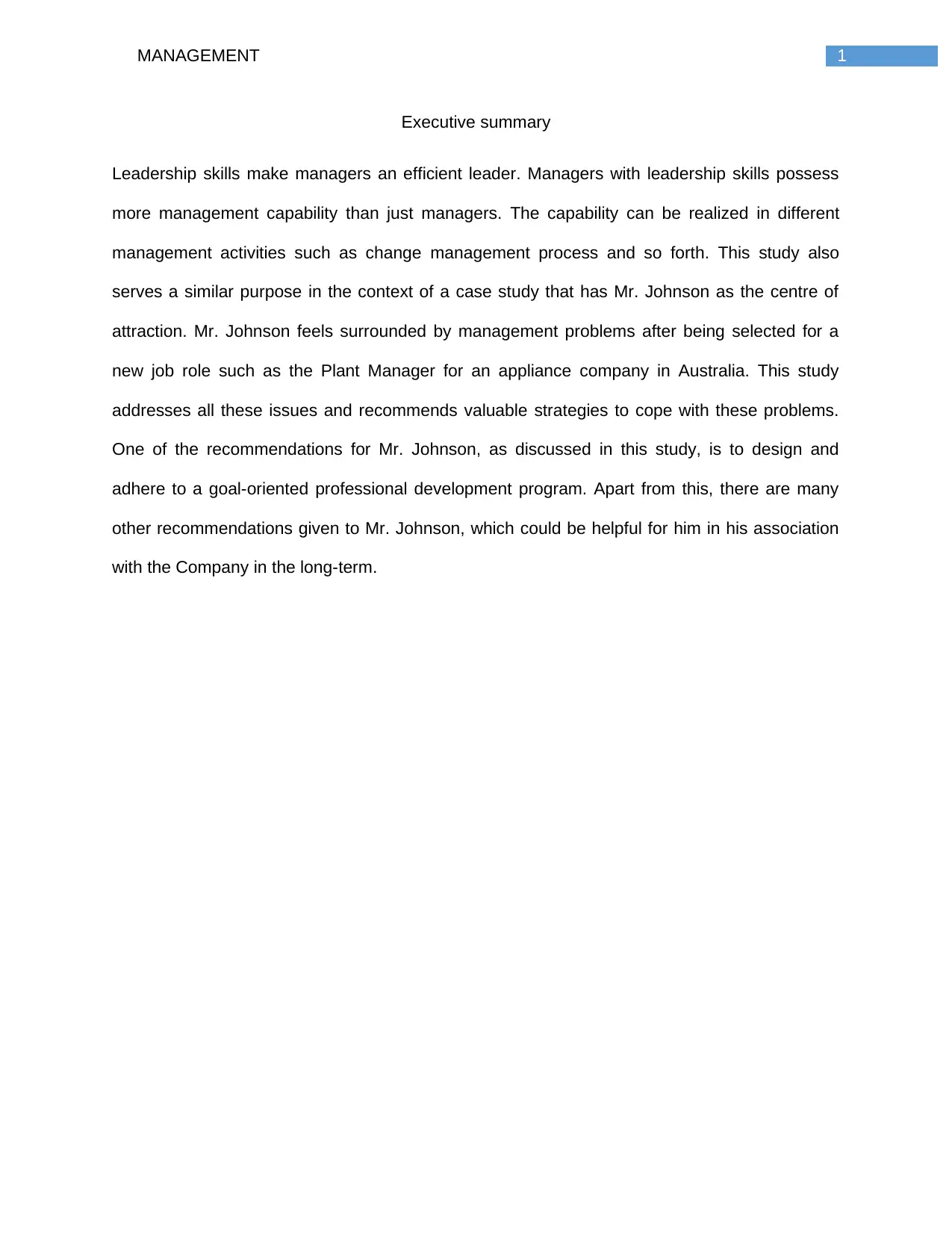
1MANAGEMENT
Executive summary
Leadership skills make managers an efficient leader. Managers with leadership skills possess
more management capability than just managers. The capability can be realized in different
management activities such as change management process and so forth. This study also
serves a similar purpose in the context of a case study that has Mr. Johnson as the centre of
attraction. Mr. Johnson feels surrounded by management problems after being selected for a
new job role such as the Plant Manager for an appliance company in Australia. This study
addresses all these issues and recommends valuable strategies to cope with these problems.
One of the recommendations for Mr. Johnson, as discussed in this study, is to design and
adhere to a goal-oriented professional development program. Apart from this, there are many
other recommendations given to Mr. Johnson, which could be helpful for him in his association
with the Company in the long-term.
Executive summary
Leadership skills make managers an efficient leader. Managers with leadership skills possess
more management capability than just managers. The capability can be realized in different
management activities such as change management process and so forth. This study also
serves a similar purpose in the context of a case study that has Mr. Johnson as the centre of
attraction. Mr. Johnson feels surrounded by management problems after being selected for a
new job role such as the Plant Manager for an appliance company in Australia. This study
addresses all these issues and recommends valuable strategies to cope with these problems.
One of the recommendations for Mr. Johnson, as discussed in this study, is to design and
adhere to a goal-oriented professional development program. Apart from this, there are many
other recommendations given to Mr. Johnson, which could be helpful for him in his association
with the Company in the long-term.
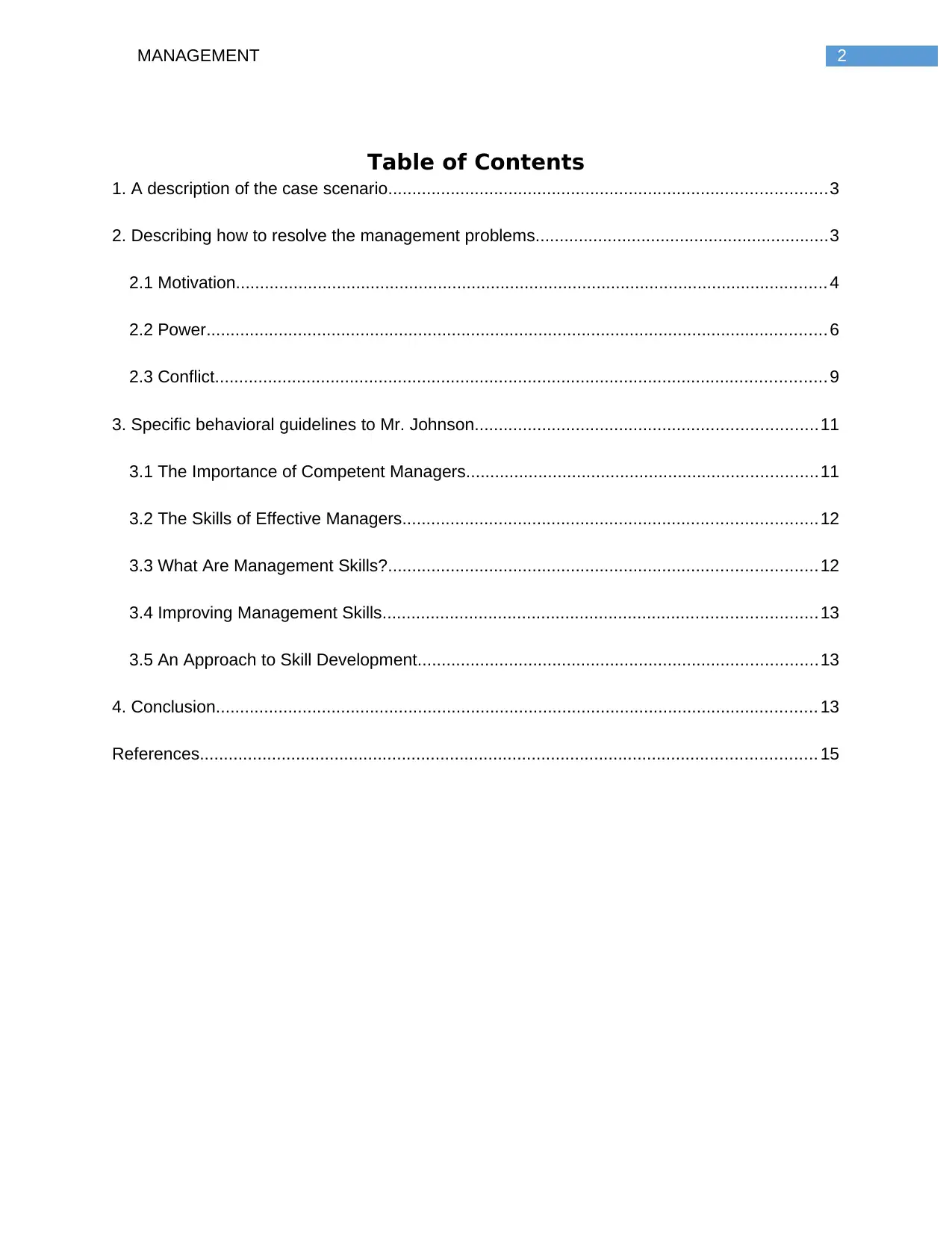
2MANAGEMENT
Table of Contents
1. A description of the case scenario...........................................................................................3
2. Describing how to resolve the management problems.............................................................3
2.1 Motivation........................................................................................................................... 4
2.2 Power................................................................................................................................. 6
2.3 Conflict............................................................................................................................... 9
3. Specific behavioral guidelines to Mr. Johnson.......................................................................11
3.1 The Importance of Competent Managers.........................................................................11
3.2 The Skills of Effective Managers......................................................................................12
3.3 What Are Management Skills?.........................................................................................12
3.4 Improving Management Skills..........................................................................................13
3.5 An Approach to Skill Development...................................................................................13
4. Conclusion............................................................................................................................. 13
References................................................................................................................................ 15
Table of Contents
1. A description of the case scenario...........................................................................................3
2. Describing how to resolve the management problems.............................................................3
2.1 Motivation........................................................................................................................... 4
2.2 Power................................................................................................................................. 6
2.3 Conflict............................................................................................................................... 9
3. Specific behavioral guidelines to Mr. Johnson.......................................................................11
3.1 The Importance of Competent Managers.........................................................................11
3.2 The Skills of Effective Managers......................................................................................12
3.3 What Are Management Skills?.........................................................................................12
3.4 Improving Management Skills..........................................................................................13
3.5 An Approach to Skill Development...................................................................................13
4. Conclusion............................................................................................................................. 13
References................................................................................................................................ 15
⊘ This is a preview!⊘
Do you want full access?
Subscribe today to unlock all pages.

Trusted by 1+ million students worldwide
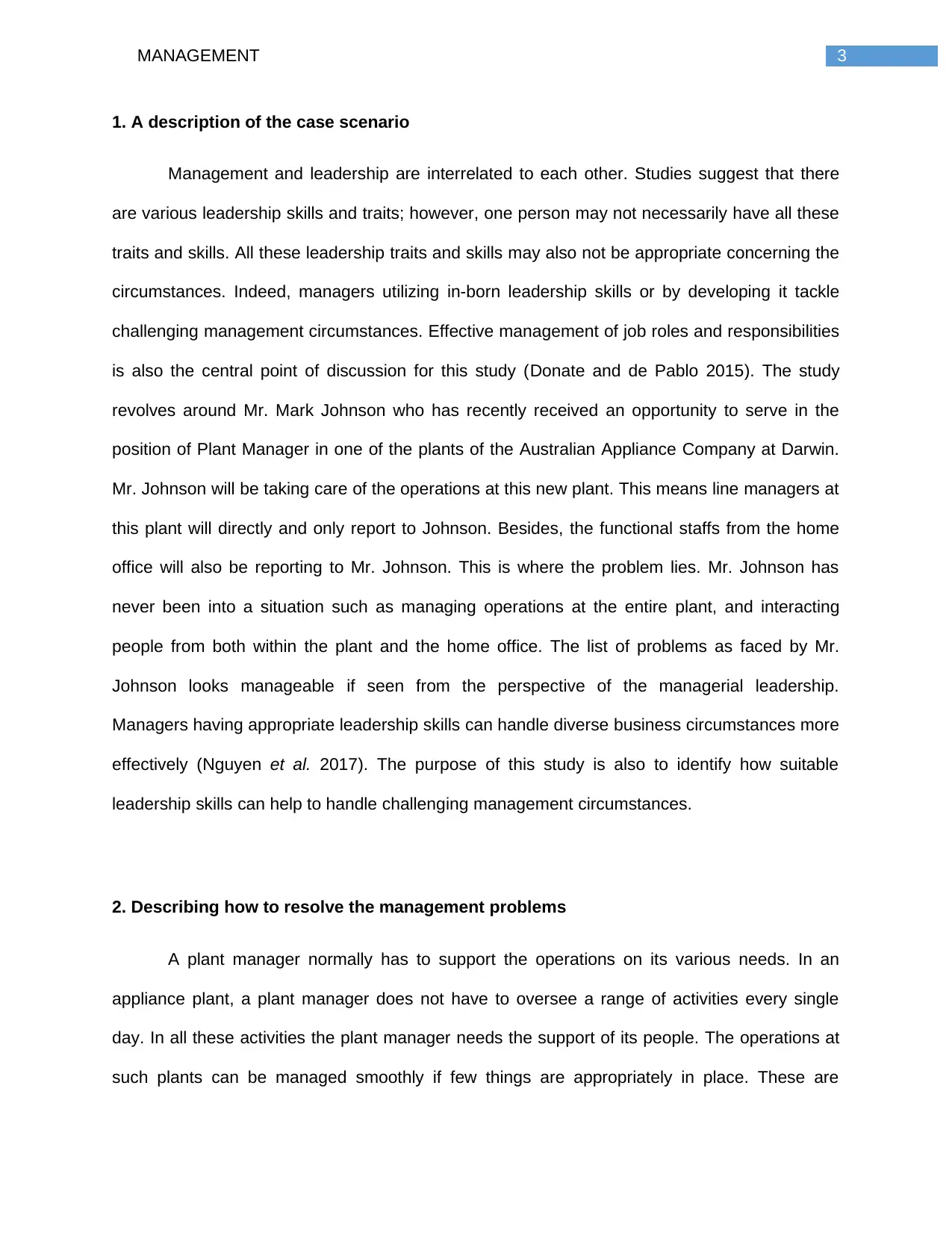
3MANAGEMENT
1. A description of the case scenario
Management and leadership are interrelated to each other. Studies suggest that there
are various leadership skills and traits; however, one person may not necessarily have all these
traits and skills. All these leadership traits and skills may also not be appropriate concerning the
circumstances. Indeed, managers utilizing in-born leadership skills or by developing it tackle
challenging management circumstances. Effective management of job roles and responsibilities
is also the central point of discussion for this study (Donate and de Pablo 2015). The study
revolves around Mr. Mark Johnson who has recently received an opportunity to serve in the
position of Plant Manager in one of the plants of the Australian Appliance Company at Darwin.
Mr. Johnson will be taking care of the operations at this new plant. This means line managers at
this plant will directly and only report to Johnson. Besides, the functional staffs from the home
office will also be reporting to Mr. Johnson. This is where the problem lies. Mr. Johnson has
never been into a situation such as managing operations at the entire plant, and interacting
people from both within the plant and the home office. The list of problems as faced by Mr.
Johnson looks manageable if seen from the perspective of the managerial leadership.
Managers having appropriate leadership skills can handle diverse business circumstances more
effectively (Nguyen et al. 2017). The purpose of this study is also to identify how suitable
leadership skills can help to handle challenging management circumstances.
2. Describing how to resolve the management problems
A plant manager normally has to support the operations on its various needs. In an
appliance plant, a plant manager does not have to oversee a range of activities every single
day. In all these activities the plant manager needs the support of its people. The operations at
such plants can be managed smoothly if few things are appropriately in place. These are
1. A description of the case scenario
Management and leadership are interrelated to each other. Studies suggest that there
are various leadership skills and traits; however, one person may not necessarily have all these
traits and skills. All these leadership traits and skills may also not be appropriate concerning the
circumstances. Indeed, managers utilizing in-born leadership skills or by developing it tackle
challenging management circumstances. Effective management of job roles and responsibilities
is also the central point of discussion for this study (Donate and de Pablo 2015). The study
revolves around Mr. Mark Johnson who has recently received an opportunity to serve in the
position of Plant Manager in one of the plants of the Australian Appliance Company at Darwin.
Mr. Johnson will be taking care of the operations at this new plant. This means line managers at
this plant will directly and only report to Johnson. Besides, the functional staffs from the home
office will also be reporting to Mr. Johnson. This is where the problem lies. Mr. Johnson has
never been into a situation such as managing operations at the entire plant, and interacting
people from both within the plant and the home office. The list of problems as faced by Mr.
Johnson looks manageable if seen from the perspective of the managerial leadership.
Managers having appropriate leadership skills can handle diverse business circumstances more
effectively (Nguyen et al. 2017). The purpose of this study is also to identify how suitable
leadership skills can help to handle challenging management circumstances.
2. Describing how to resolve the management problems
A plant manager normally has to support the operations on its various needs. In an
appliance plant, a plant manager does not have to oversee a range of activities every single
day. In all these activities the plant manager needs the support of its people. The operations at
such plants can be managed smoothly if few things are appropriately in place. These are
Paraphrase This Document
Need a fresh take? Get an instant paraphrase of this document with our AI Paraphraser
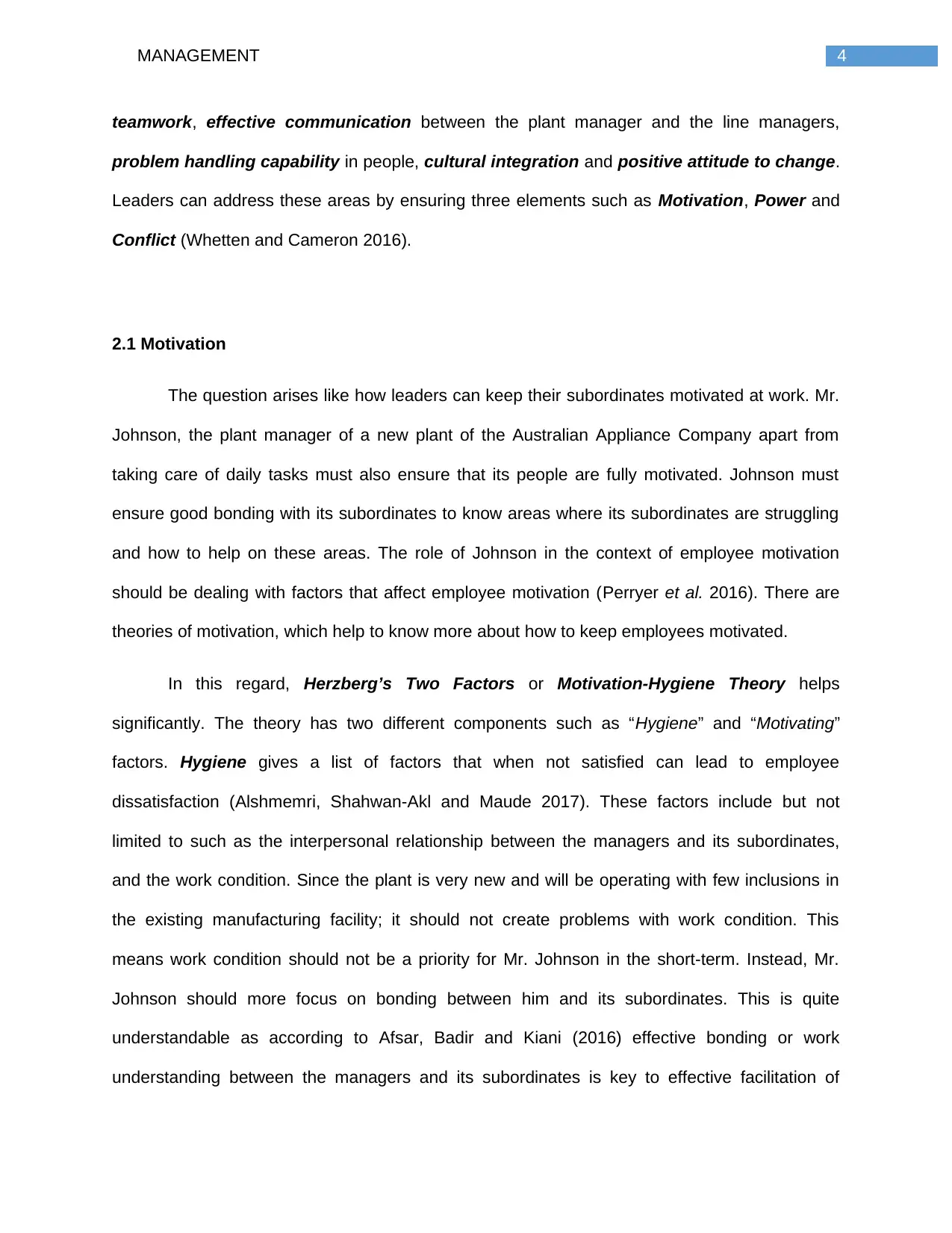
4MANAGEMENT
teamwork, effective communication between the plant manager and the line managers,
problem handling capability in people, cultural integration and positive attitude to change.
Leaders can address these areas by ensuring three elements such as Motivation, Power and
Conflict (Whetten and Cameron 2016).
2.1 Motivation
The question arises like how leaders can keep their subordinates motivated at work. Mr.
Johnson, the plant manager of a new plant of the Australian Appliance Company apart from
taking care of daily tasks must also ensure that its people are fully motivated. Johnson must
ensure good bonding with its subordinates to know areas where its subordinates are struggling
and how to help on these areas. The role of Johnson in the context of employee motivation
should be dealing with factors that affect employee motivation (Perryer et al. 2016). There are
theories of motivation, which help to know more about how to keep employees motivated.
In this regard, Herzberg’s Two Factors or Motivation-Hygiene Theory helps
significantly. The theory has two different components such as “Hygiene” and “Motivating”
factors. Hygiene gives a list of factors that when not satisfied can lead to employee
dissatisfaction (Alshmemri, Shahwan-Akl and Maude 2017). These factors include but not
limited to such as the interpersonal relationship between the managers and its subordinates,
and the work condition. Since the plant is very new and will be operating with few inclusions in
the existing manufacturing facility; it should not create problems with work condition. This
means work condition should not be a priority for Mr. Johnson in the short-term. Instead, Mr.
Johnson should more focus on bonding between him and its subordinates. This is quite
understandable as according to Afsar, Badir and Kiani (2016) effective bonding or work
understanding between the managers and its subordinates is key to effective facilitation of
teamwork, effective communication between the plant manager and the line managers,
problem handling capability in people, cultural integration and positive attitude to change.
Leaders can address these areas by ensuring three elements such as Motivation, Power and
Conflict (Whetten and Cameron 2016).
2.1 Motivation
The question arises like how leaders can keep their subordinates motivated at work. Mr.
Johnson, the plant manager of a new plant of the Australian Appliance Company apart from
taking care of daily tasks must also ensure that its people are fully motivated. Johnson must
ensure good bonding with its subordinates to know areas where its subordinates are struggling
and how to help on these areas. The role of Johnson in the context of employee motivation
should be dealing with factors that affect employee motivation (Perryer et al. 2016). There are
theories of motivation, which help to know more about how to keep employees motivated.
In this regard, Herzberg’s Two Factors or Motivation-Hygiene Theory helps
significantly. The theory has two different components such as “Hygiene” and “Motivating”
factors. Hygiene gives a list of factors that when not satisfied can lead to employee
dissatisfaction (Alshmemri, Shahwan-Akl and Maude 2017). These factors include but not
limited to such as the interpersonal relationship between the managers and its subordinates,
and the work condition. Since the plant is very new and will be operating with few inclusions in
the existing manufacturing facility; it should not create problems with work condition. This
means work condition should not be a priority for Mr. Johnson in the short-term. Instead, Mr.
Johnson should more focus on bonding between him and its subordinates. This is quite
understandable as according to Afsar, Badir and Kiani (2016) effective bonding or work
understanding between the managers and its subordinates is key to effective facilitation of
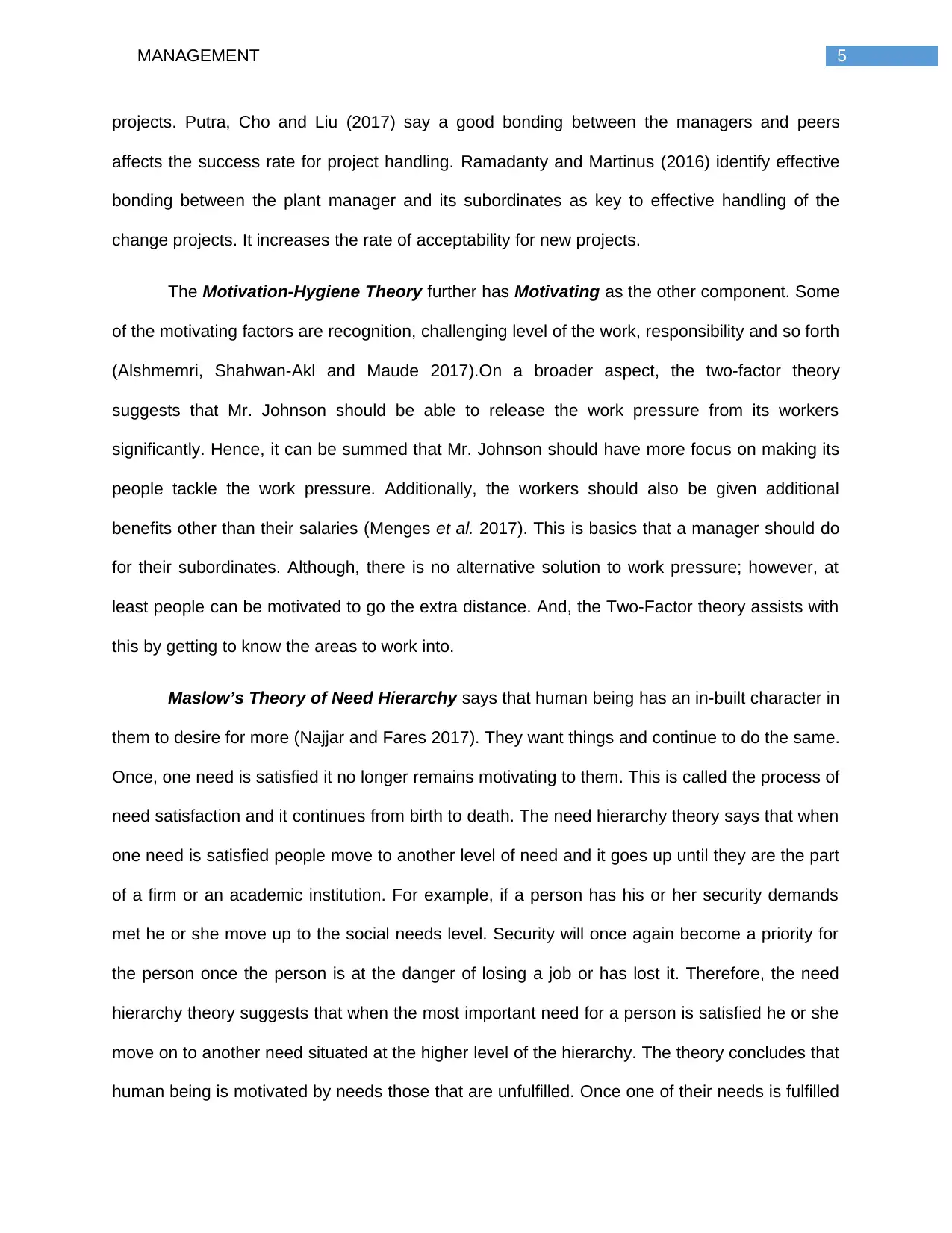
5MANAGEMENT
projects. Putra, Cho and Liu (2017) say a good bonding between the managers and peers
affects the success rate for project handling. Ramadanty and Martinus (2016) identify effective
bonding between the plant manager and its subordinates as key to effective handling of the
change projects. It increases the rate of acceptability for new projects.
The Motivation-Hygiene Theory further has Motivating as the other component. Some
of the motivating factors are recognition, challenging level of the work, responsibility and so forth
(Alshmemri, Shahwan-Akl and Maude 2017).On a broader aspect, the two-factor theory
suggests that Mr. Johnson should be able to release the work pressure from its workers
significantly. Hence, it can be summed that Mr. Johnson should have more focus on making its
people tackle the work pressure. Additionally, the workers should also be given additional
benefits other than their salaries (Menges et al. 2017). This is basics that a manager should do
for their subordinates. Although, there is no alternative solution to work pressure; however, at
least people can be motivated to go the extra distance. And, the Two-Factor theory assists with
this by getting to know the areas to work into.
Maslow’s Theory of Need Hierarchy says that human being has an in-built character in
them to desire for more (Najjar and Fares 2017). They want things and continue to do the same.
Once, one need is satisfied it no longer remains motivating to them. This is called the process of
need satisfaction and it continues from birth to death. The need hierarchy theory says that when
one need is satisfied people move to another level of need and it goes up until they are the part
of a firm or an academic institution. For example, if a person has his or her security demands
met he or she move up to the social needs level. Security will once again become a priority for
the person once the person is at the danger of losing a job or has lost it. Therefore, the need
hierarchy theory suggests that when the most important need for a person is satisfied he or she
move on to another need situated at the higher level of the hierarchy. The theory concludes that
human being is motivated by needs those that are unfulfilled. Once one of their needs is fulfilled
projects. Putra, Cho and Liu (2017) say a good bonding between the managers and peers
affects the success rate for project handling. Ramadanty and Martinus (2016) identify effective
bonding between the plant manager and its subordinates as key to effective handling of the
change projects. It increases the rate of acceptability for new projects.
The Motivation-Hygiene Theory further has Motivating as the other component. Some
of the motivating factors are recognition, challenging level of the work, responsibility and so forth
(Alshmemri, Shahwan-Akl and Maude 2017).On a broader aspect, the two-factor theory
suggests that Mr. Johnson should be able to release the work pressure from its workers
significantly. Hence, it can be summed that Mr. Johnson should have more focus on making its
people tackle the work pressure. Additionally, the workers should also be given additional
benefits other than their salaries (Menges et al. 2017). This is basics that a manager should do
for their subordinates. Although, there is no alternative solution to work pressure; however, at
least people can be motivated to go the extra distance. And, the Two-Factor theory assists with
this by getting to know the areas to work into.
Maslow’s Theory of Need Hierarchy says that human being has an in-built character in
them to desire for more (Najjar and Fares 2017). They want things and continue to do the same.
Once, one need is satisfied it no longer remains motivating to them. This is called the process of
need satisfaction and it continues from birth to death. The need hierarchy theory says that when
one need is satisfied people move to another level of need and it goes up until they are the part
of a firm or an academic institution. For example, if a person has his or her security demands
met he or she move up to the social needs level. Security will once again become a priority for
the person once the person is at the danger of losing a job or has lost it. Therefore, the need
hierarchy theory suggests that when the most important need for a person is satisfied he or she
move on to another need situated at the higher level of the hierarchy. The theory concludes that
human being is motivated by needs those that are unfulfilled. Once one of their needs is fulfilled
⊘ This is a preview!⊘
Do you want full access?
Subscribe today to unlock all pages.

Trusted by 1+ million students worldwide
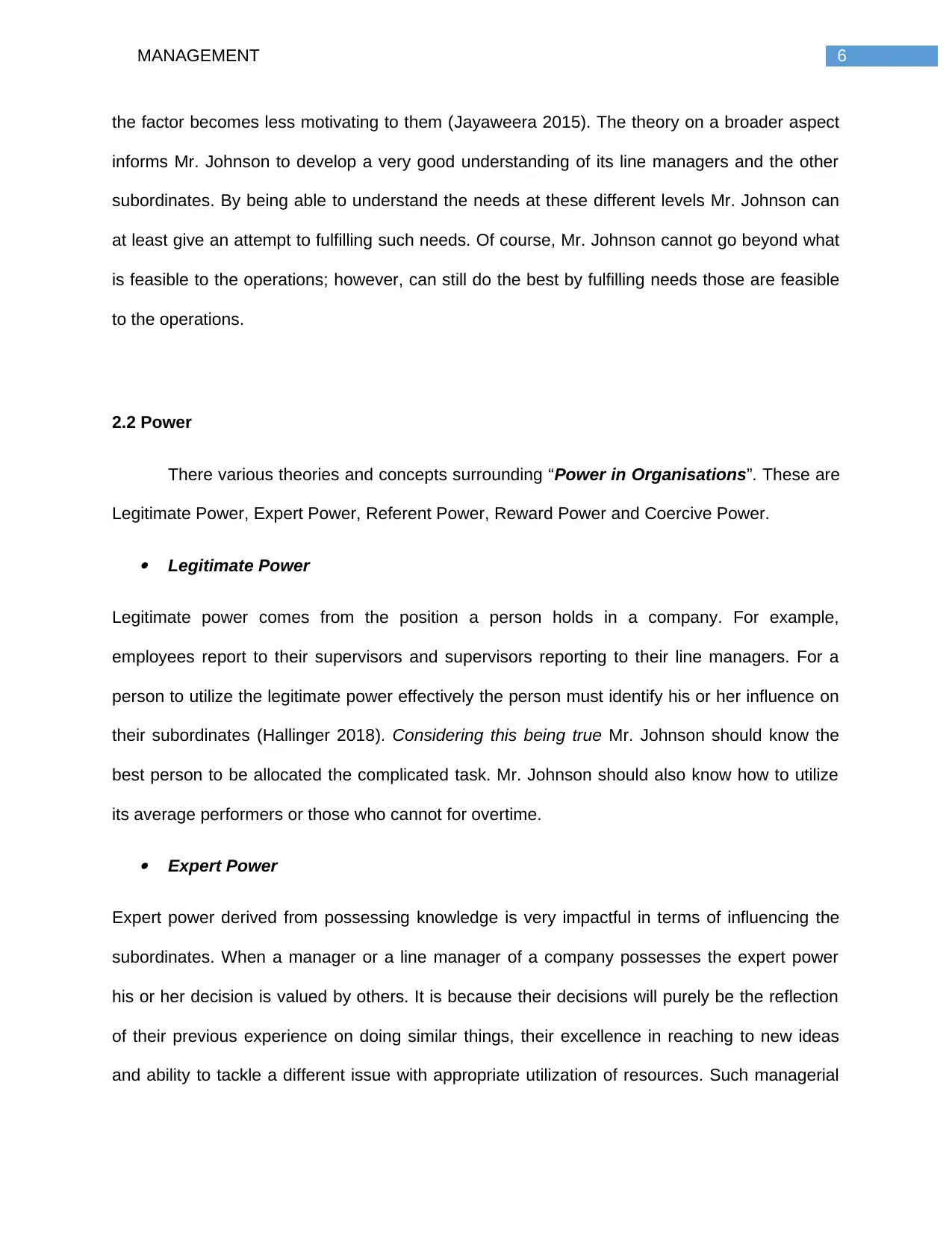
6MANAGEMENT
the factor becomes less motivating to them (Jayaweera 2015). The theory on a broader aspect
informs Mr. Johnson to develop a very good understanding of its line managers and the other
subordinates. By being able to understand the needs at these different levels Mr. Johnson can
at least give an attempt to fulfilling such needs. Of course, Mr. Johnson cannot go beyond what
is feasible to the operations; however, can still do the best by fulfilling needs those are feasible
to the operations.
2.2 Power
There various theories and concepts surrounding “Power in Organisations”. These are
Legitimate Power, Expert Power, Referent Power, Reward Power and Coercive Power.
Legitimate Power
Legitimate power comes from the position a person holds in a company. For example,
employees report to their supervisors and supervisors reporting to their line managers. For a
person to utilize the legitimate power effectively the person must identify his or her influence on
their subordinates (Hallinger 2018). Considering this being true Mr. Johnson should know the
best person to be allocated the complicated task. Mr. Johnson should also know how to utilize
its average performers or those who cannot for overtime.
Expert Power
Expert power derived from possessing knowledge is very impactful in terms of influencing the
subordinates. When a manager or a line manager of a company possesses the expert power
his or her decision is valued by others. It is because their decisions will purely be the reflection
of their previous experience on doing similar things, their excellence in reaching to new ideas
and ability to tackle a different issue with appropriate utilization of resources. Such managerial
the factor becomes less motivating to them (Jayaweera 2015). The theory on a broader aspect
informs Mr. Johnson to develop a very good understanding of its line managers and the other
subordinates. By being able to understand the needs at these different levels Mr. Johnson can
at least give an attempt to fulfilling such needs. Of course, Mr. Johnson cannot go beyond what
is feasible to the operations; however, can still do the best by fulfilling needs those are feasible
to the operations.
2.2 Power
There various theories and concepts surrounding “Power in Organisations”. These are
Legitimate Power, Expert Power, Referent Power, Reward Power and Coercive Power.
Legitimate Power
Legitimate power comes from the position a person holds in a company. For example,
employees report to their supervisors and supervisors reporting to their line managers. For a
person to utilize the legitimate power effectively the person must identify his or her influence on
their subordinates (Hallinger 2018). Considering this being true Mr. Johnson should know the
best person to be allocated the complicated task. Mr. Johnson should also know how to utilize
its average performers or those who cannot for overtime.
Expert Power
Expert power derived from possessing knowledge is very impactful in terms of influencing the
subordinates. When a manager or a line manager of a company possesses the expert power
his or her decision is valued by others. It is because their decisions will purely be the reflection
of their previous experience on doing similar things, their excellence in reaching to new ideas
and ability to tackle a different issue with appropriate utilization of resources. Such managerial
Paraphrase This Document
Need a fresh take? Get an instant paraphrase of this document with our AI Paraphraser
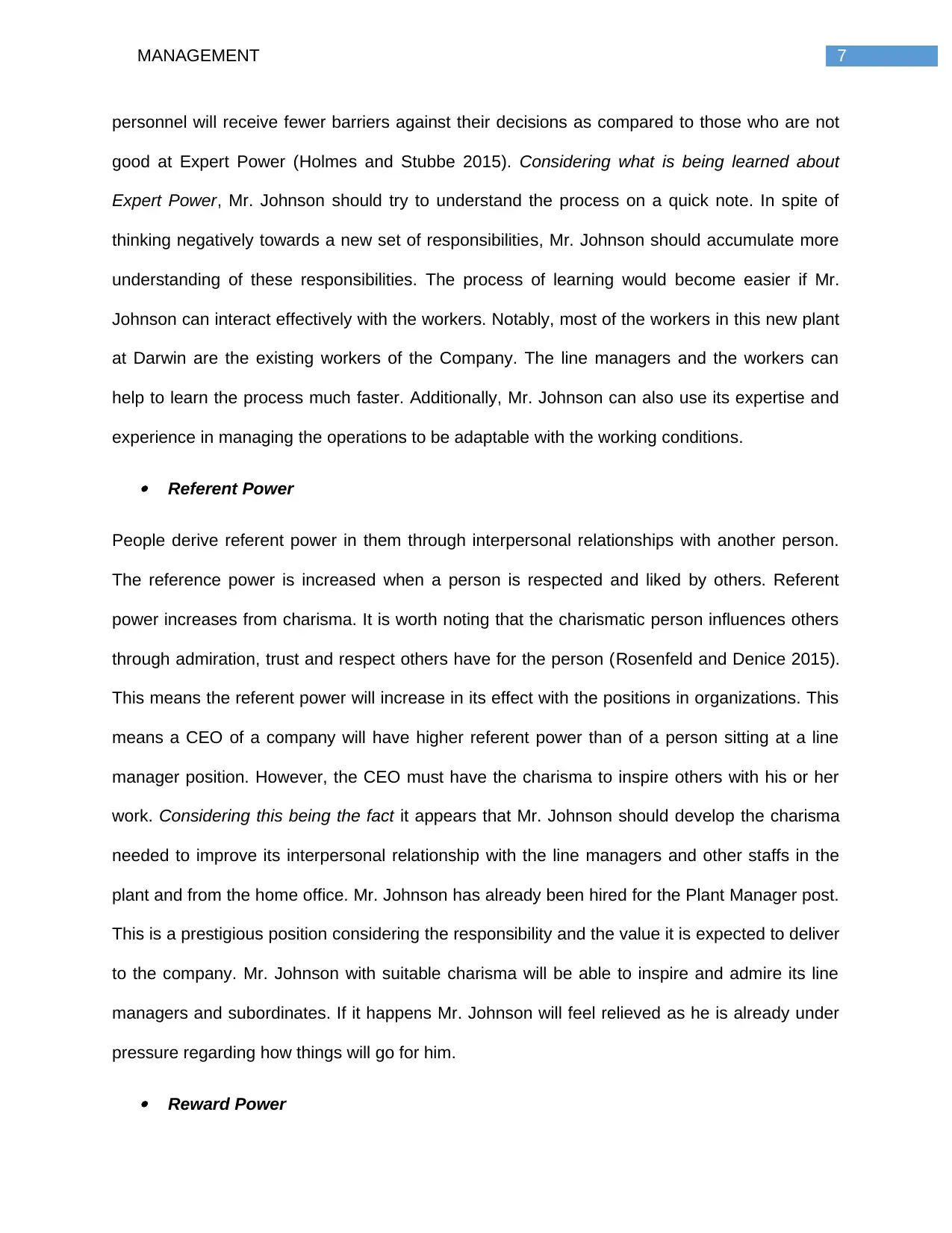
7MANAGEMENT
personnel will receive fewer barriers against their decisions as compared to those who are not
good at Expert Power (Holmes and Stubbe 2015). Considering what is being learned about
Expert Power, Mr. Johnson should try to understand the process on a quick note. In spite of
thinking negatively towards a new set of responsibilities, Mr. Johnson should accumulate more
understanding of these responsibilities. The process of learning would become easier if Mr.
Johnson can interact effectively with the workers. Notably, most of the workers in this new plant
at Darwin are the existing workers of the Company. The line managers and the workers can
help to learn the process much faster. Additionally, Mr. Johnson can also use its expertise and
experience in managing the operations to be adaptable with the working conditions.
Referent Power
People derive referent power in them through interpersonal relationships with another person.
The reference power is increased when a person is respected and liked by others. Referent
power increases from charisma. It is worth noting that the charismatic person influences others
through admiration, trust and respect others have for the person (Rosenfeld and Denice 2015).
This means the referent power will increase in its effect with the positions in organizations. This
means a CEO of a company will have higher referent power than of a person sitting at a line
manager position. However, the CEO must have the charisma to inspire others with his or her
work. Considering this being the fact it appears that Mr. Johnson should develop the charisma
needed to improve its interpersonal relationship with the line managers and other staffs in the
plant and from the home office. Mr. Johnson has already been hired for the Plant Manager post.
This is a prestigious position considering the responsibility and the value it is expected to deliver
to the company. Mr. Johnson with suitable charisma will be able to inspire and admire its line
managers and subordinates. If it happens Mr. Johnson will feel relieved as he is already under
pressure regarding how things will go for him.
Reward Power
personnel will receive fewer barriers against their decisions as compared to those who are not
good at Expert Power (Holmes and Stubbe 2015). Considering what is being learned about
Expert Power, Mr. Johnson should try to understand the process on a quick note. In spite of
thinking negatively towards a new set of responsibilities, Mr. Johnson should accumulate more
understanding of these responsibilities. The process of learning would become easier if Mr.
Johnson can interact effectively with the workers. Notably, most of the workers in this new plant
at Darwin are the existing workers of the Company. The line managers and the workers can
help to learn the process much faster. Additionally, Mr. Johnson can also use its expertise and
experience in managing the operations to be adaptable with the working conditions.
Referent Power
People derive referent power in them through interpersonal relationships with another person.
The reference power is increased when a person is respected and liked by others. Referent
power increases from charisma. It is worth noting that the charismatic person influences others
through admiration, trust and respect others have for the person (Rosenfeld and Denice 2015).
This means the referent power will increase in its effect with the positions in organizations. This
means a CEO of a company will have higher referent power than of a person sitting at a line
manager position. However, the CEO must have the charisma to inspire others with his or her
work. Considering this being the fact it appears that Mr. Johnson should develop the charisma
needed to improve its interpersonal relationship with the line managers and other staffs in the
plant and from the home office. Mr. Johnson has already been hired for the Plant Manager post.
This is a prestigious position considering the responsibility and the value it is expected to deliver
to the company. Mr. Johnson with suitable charisma will be able to inspire and admire its line
managers and subordinates. If it happens Mr. Johnson will feel relieved as he is already under
pressure regarding how things will go for him.
Reward Power
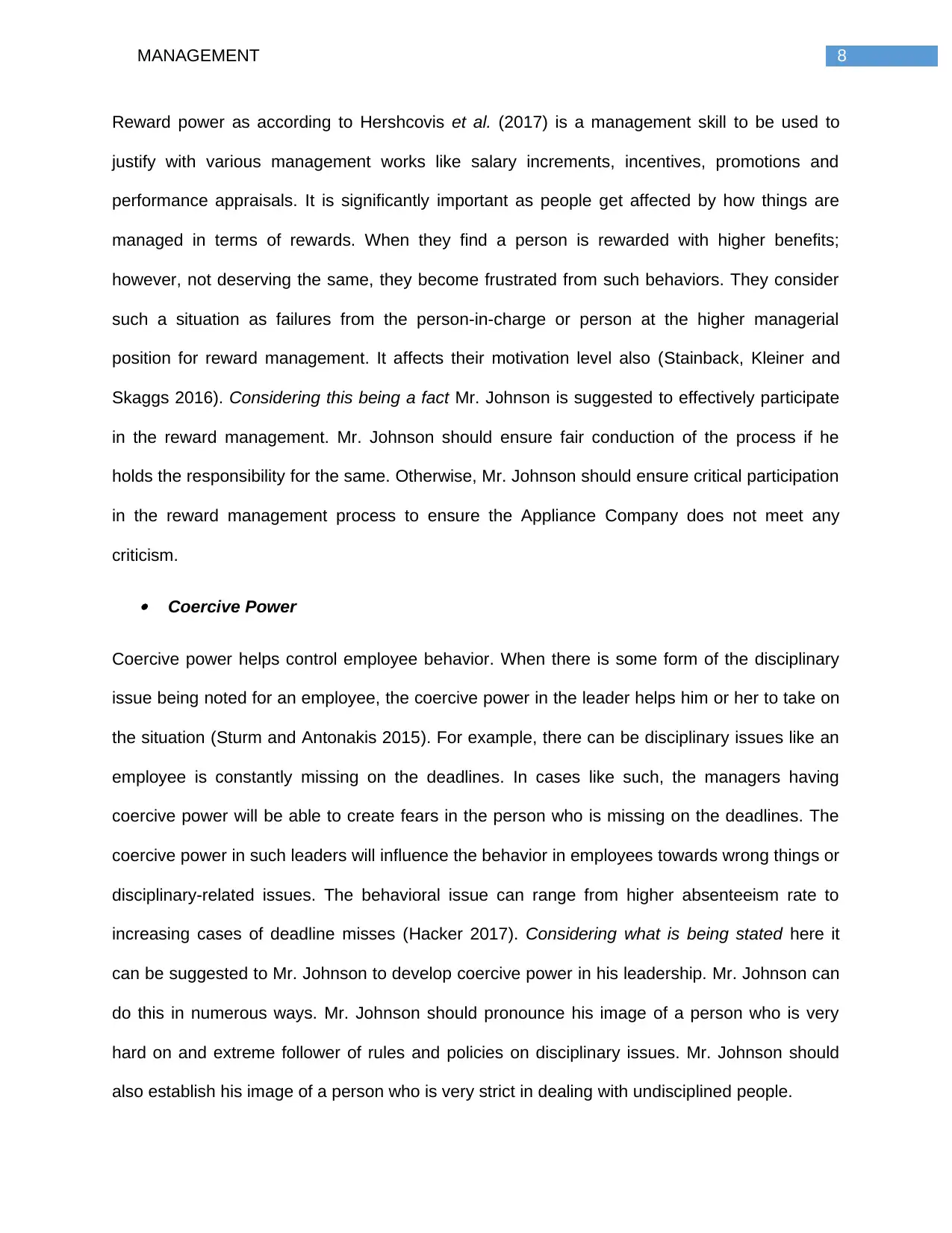
8MANAGEMENT
Reward power as according to Hershcovis et al. (2017) is a management skill to be used to
justify with various management works like salary increments, incentives, promotions and
performance appraisals. It is significantly important as people get affected by how things are
managed in terms of rewards. When they find a person is rewarded with higher benefits;
however, not deserving the same, they become frustrated from such behaviors. They consider
such a situation as failures from the person-in-charge or person at the higher managerial
position for reward management. It affects their motivation level also (Stainback, Kleiner and
Skaggs 2016). Considering this being a fact Mr. Johnson is suggested to effectively participate
in the reward management. Mr. Johnson should ensure fair conduction of the process if he
holds the responsibility for the same. Otherwise, Mr. Johnson should ensure critical participation
in the reward management process to ensure the Appliance Company does not meet any
criticism.
Coercive Power
Coercive power helps control employee behavior. When there is some form of the disciplinary
issue being noted for an employee, the coercive power in the leader helps him or her to take on
the situation (Sturm and Antonakis 2015). For example, there can be disciplinary issues like an
employee is constantly missing on the deadlines. In cases like such, the managers having
coercive power will be able to create fears in the person who is missing on the deadlines. The
coercive power in such leaders will influence the behavior in employees towards wrong things or
disciplinary-related issues. The behavioral issue can range from higher absenteeism rate to
increasing cases of deadline misses (Hacker 2017). Considering what is being stated here it
can be suggested to Mr. Johnson to develop coercive power in his leadership. Mr. Johnson can
do this in numerous ways. Mr. Johnson should pronounce his image of a person who is very
hard on and extreme follower of rules and policies on disciplinary issues. Mr. Johnson should
also establish his image of a person who is very strict in dealing with undisciplined people.
Reward power as according to Hershcovis et al. (2017) is a management skill to be used to
justify with various management works like salary increments, incentives, promotions and
performance appraisals. It is significantly important as people get affected by how things are
managed in terms of rewards. When they find a person is rewarded with higher benefits;
however, not deserving the same, they become frustrated from such behaviors. They consider
such a situation as failures from the person-in-charge or person at the higher managerial
position for reward management. It affects their motivation level also (Stainback, Kleiner and
Skaggs 2016). Considering this being a fact Mr. Johnson is suggested to effectively participate
in the reward management. Mr. Johnson should ensure fair conduction of the process if he
holds the responsibility for the same. Otherwise, Mr. Johnson should ensure critical participation
in the reward management process to ensure the Appliance Company does not meet any
criticism.
Coercive Power
Coercive power helps control employee behavior. When there is some form of the disciplinary
issue being noted for an employee, the coercive power in the leader helps him or her to take on
the situation (Sturm and Antonakis 2015). For example, there can be disciplinary issues like an
employee is constantly missing on the deadlines. In cases like such, the managers having
coercive power will be able to create fears in the person who is missing on the deadlines. The
coercive power in such leaders will influence the behavior in employees towards wrong things or
disciplinary-related issues. The behavioral issue can range from higher absenteeism rate to
increasing cases of deadline misses (Hacker 2017). Considering what is being stated here it
can be suggested to Mr. Johnson to develop coercive power in his leadership. Mr. Johnson can
do this in numerous ways. Mr. Johnson should pronounce his image of a person who is very
hard on and extreme follower of rules and policies on disciplinary issues. Mr. Johnson should
also establish his image of a person who is very strict in dealing with undisciplined people.
⊘ This is a preview!⊘
Do you want full access?
Subscribe today to unlock all pages.

Trusted by 1+ million students worldwide
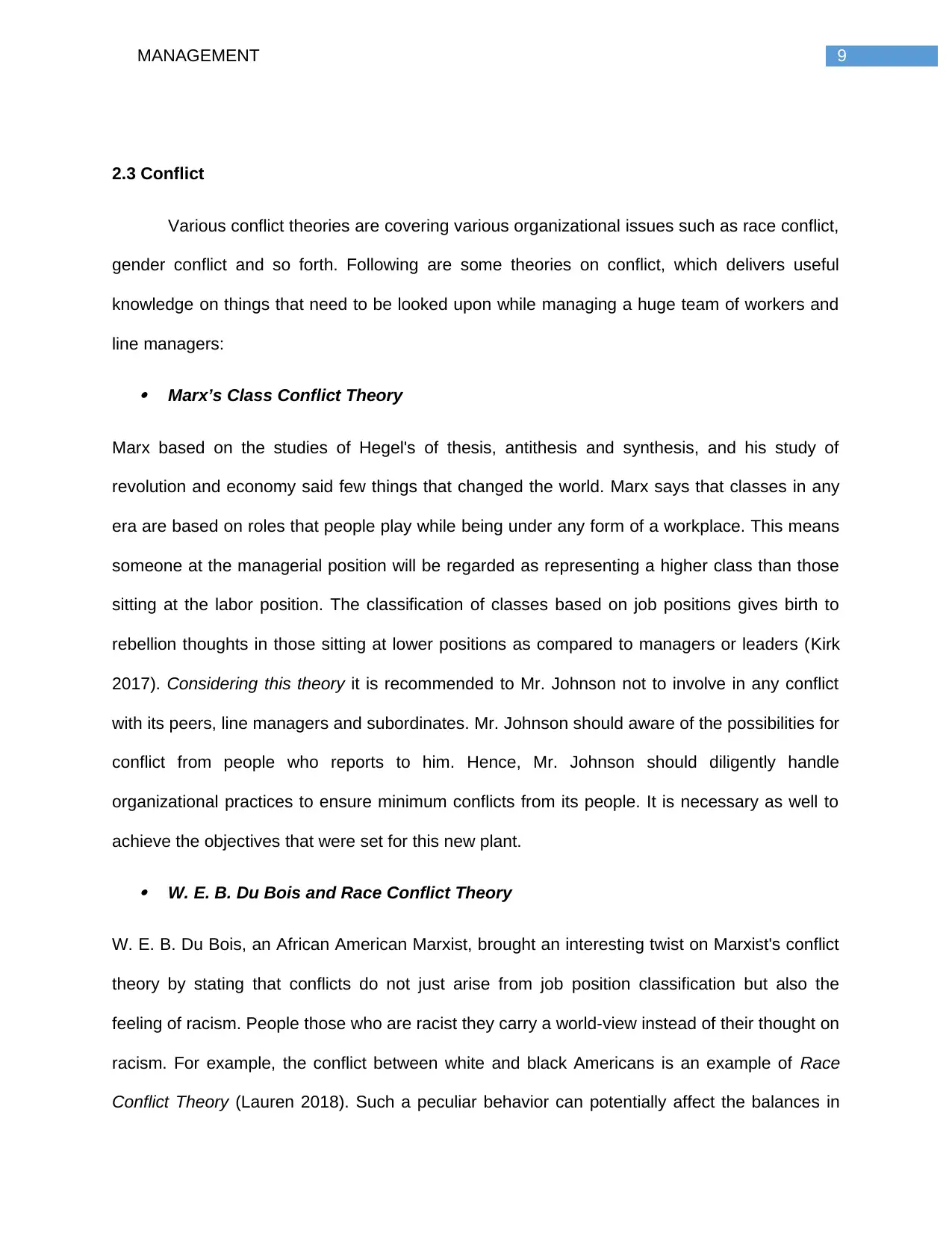
9MANAGEMENT
2.3 Conflict
Various conflict theories are covering various organizational issues such as race conflict,
gender conflict and so forth. Following are some theories on conflict, which delivers useful
knowledge on things that need to be looked upon while managing a huge team of workers and
line managers:
Marx’s Class Conflict Theory
Marx based on the studies of Hegel's of thesis, antithesis and synthesis, and his study of
revolution and economy said few things that changed the world. Marx says that classes in any
era are based on roles that people play while being under any form of a workplace. This means
someone at the managerial position will be regarded as representing a higher class than those
sitting at the labor position. The classification of classes based on job positions gives birth to
rebellion thoughts in those sitting at lower positions as compared to managers or leaders (Kirk
2017). Considering this theory it is recommended to Mr. Johnson not to involve in any conflict
with its peers, line managers and subordinates. Mr. Johnson should aware of the possibilities for
conflict from people who reports to him. Hence, Mr. Johnson should diligently handle
organizational practices to ensure minimum conflicts from its people. It is necessary as well to
achieve the objectives that were set for this new plant.
W. E. B. Du Bois and Race Conflict Theory
W. E. B. Du Bois, an African American Marxist, brought an interesting twist on Marxist's conflict
theory by stating that conflicts do not just arise from job position classification but also the
feeling of racism. People those who are racist they carry a world-view instead of their thought on
racism. For example, the conflict between white and black Americans is an example of Race
Conflict Theory (Lauren 2018). Such a peculiar behavior can potentially affect the balances in
2.3 Conflict
Various conflict theories are covering various organizational issues such as race conflict,
gender conflict and so forth. Following are some theories on conflict, which delivers useful
knowledge on things that need to be looked upon while managing a huge team of workers and
line managers:
Marx’s Class Conflict Theory
Marx based on the studies of Hegel's of thesis, antithesis and synthesis, and his study of
revolution and economy said few things that changed the world. Marx says that classes in any
era are based on roles that people play while being under any form of a workplace. This means
someone at the managerial position will be regarded as representing a higher class than those
sitting at the labor position. The classification of classes based on job positions gives birth to
rebellion thoughts in those sitting at lower positions as compared to managers or leaders (Kirk
2017). Considering this theory it is recommended to Mr. Johnson not to involve in any conflict
with its peers, line managers and subordinates. Mr. Johnson should aware of the possibilities for
conflict from people who reports to him. Hence, Mr. Johnson should diligently handle
organizational practices to ensure minimum conflicts from its people. It is necessary as well to
achieve the objectives that were set for this new plant.
W. E. B. Du Bois and Race Conflict Theory
W. E. B. Du Bois, an African American Marxist, brought an interesting twist on Marxist's conflict
theory by stating that conflicts do not just arise from job position classification but also the
feeling of racism. People those who are racist they carry a world-view instead of their thought on
racism. For example, the conflict between white and black Americans is an example of Race
Conflict Theory (Lauren 2018). Such a peculiar behavior can potentially affect the balances in
Paraphrase This Document
Need a fresh take? Get an instant paraphrase of this document with our AI Paraphraser
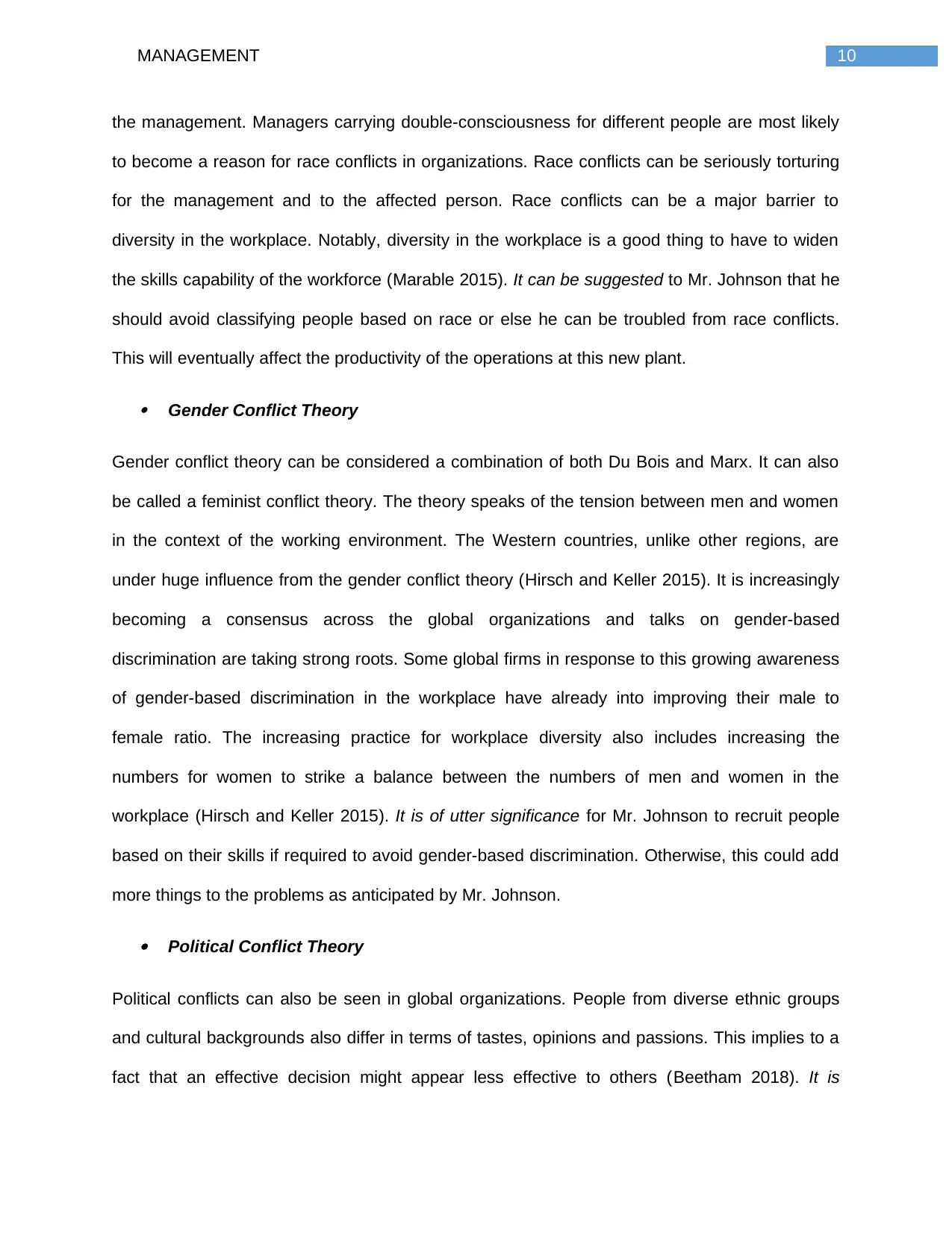
10MANAGEMENT
the management. Managers carrying double-consciousness for different people are most likely
to become a reason for race conflicts in organizations. Race conflicts can be seriously torturing
for the management and to the affected person. Race conflicts can be a major barrier to
diversity in the workplace. Notably, diversity in the workplace is a good thing to have to widen
the skills capability of the workforce (Marable 2015). It can be suggested to Mr. Johnson that he
should avoid classifying people based on race or else he can be troubled from race conflicts.
This will eventually affect the productivity of the operations at this new plant.
Gender Conflict Theory
Gender conflict theory can be considered a combination of both Du Bois and Marx. It can also
be called a feminist conflict theory. The theory speaks of the tension between men and women
in the context of the working environment. The Western countries, unlike other regions, are
under huge influence from the gender conflict theory (Hirsch and Keller 2015). It is increasingly
becoming a consensus across the global organizations and talks on gender-based
discrimination are taking strong roots. Some global firms in response to this growing awareness
of gender-based discrimination in the workplace have already into improving their male to
female ratio. The increasing practice for workplace diversity also includes increasing the
numbers for women to strike a balance between the numbers of men and women in the
workplace (Hirsch and Keller 2015). It is of utter significance for Mr. Johnson to recruit people
based on their skills if required to avoid gender-based discrimination. Otherwise, this could add
more things to the problems as anticipated by Mr. Johnson.
Political Conflict Theory
Political conflicts can also be seen in global organizations. People from diverse ethnic groups
and cultural backgrounds also differ in terms of tastes, opinions and passions. This implies to a
fact that an effective decision might appear less effective to others (Beetham 2018). It is
the management. Managers carrying double-consciousness for different people are most likely
to become a reason for race conflicts in organizations. Race conflicts can be seriously torturing
for the management and to the affected person. Race conflicts can be a major barrier to
diversity in the workplace. Notably, diversity in the workplace is a good thing to have to widen
the skills capability of the workforce (Marable 2015). It can be suggested to Mr. Johnson that he
should avoid classifying people based on race or else he can be troubled from race conflicts.
This will eventually affect the productivity of the operations at this new plant.
Gender Conflict Theory
Gender conflict theory can be considered a combination of both Du Bois and Marx. It can also
be called a feminist conflict theory. The theory speaks of the tension between men and women
in the context of the working environment. The Western countries, unlike other regions, are
under huge influence from the gender conflict theory (Hirsch and Keller 2015). It is increasingly
becoming a consensus across the global organizations and talks on gender-based
discrimination are taking strong roots. Some global firms in response to this growing awareness
of gender-based discrimination in the workplace have already into improving their male to
female ratio. The increasing practice for workplace diversity also includes increasing the
numbers for women to strike a balance between the numbers of men and women in the
workplace (Hirsch and Keller 2015). It is of utter significance for Mr. Johnson to recruit people
based on their skills if required to avoid gender-based discrimination. Otherwise, this could add
more things to the problems as anticipated by Mr. Johnson.
Political Conflict Theory
Political conflicts can also be seen in global organizations. People from diverse ethnic groups
and cultural backgrounds also differ in terms of tastes, opinions and passions. This implies to a
fact that an effective decision might appear less effective to others (Beetham 2018). It is
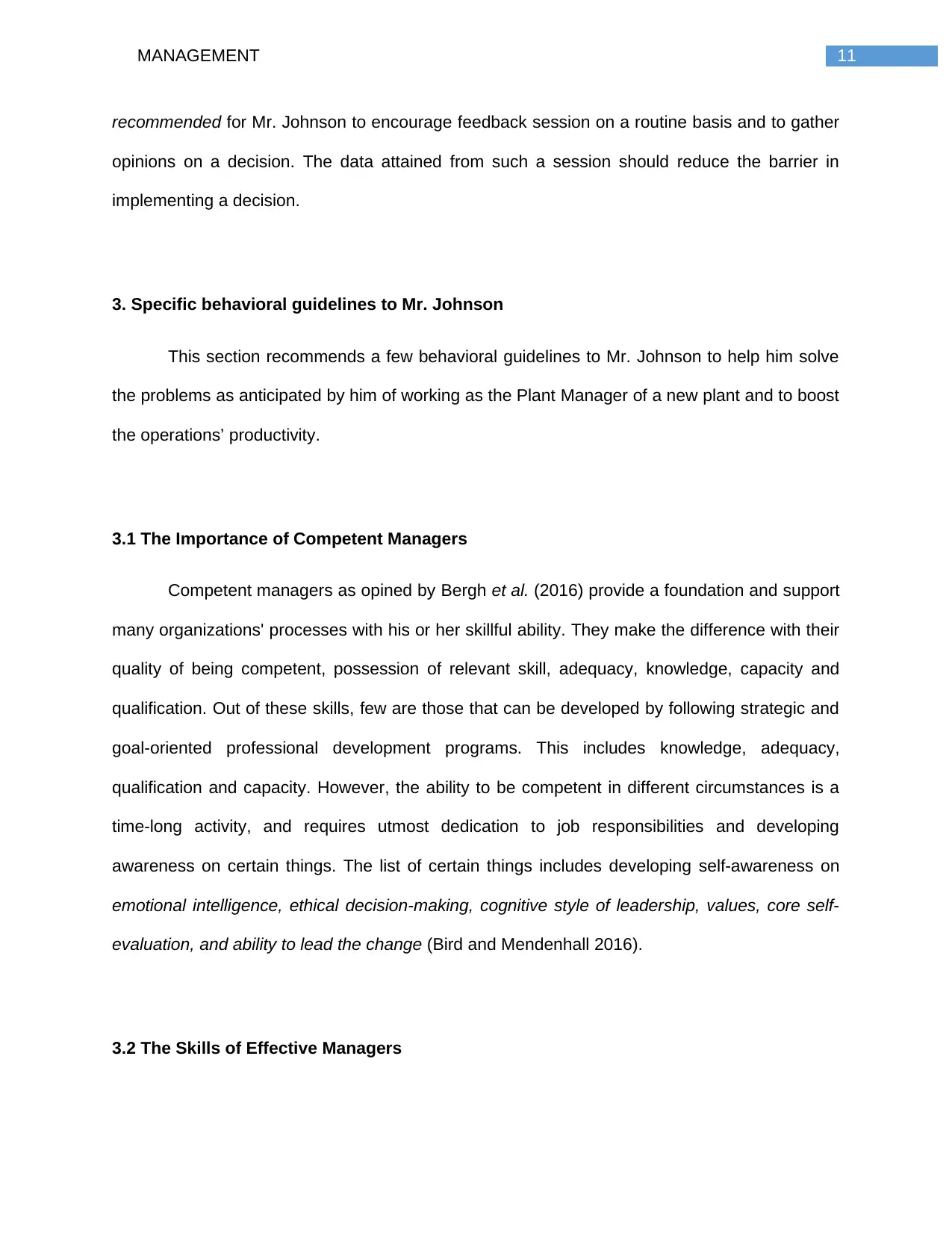
11MANAGEMENT
recommended for Mr. Johnson to encourage feedback session on a routine basis and to gather
opinions on a decision. The data attained from such a session should reduce the barrier in
implementing a decision.
3. Specific behavioral guidelines to Mr. Johnson
This section recommends a few behavioral guidelines to Mr. Johnson to help him solve
the problems as anticipated by him of working as the Plant Manager of a new plant and to boost
the operations’ productivity.
3.1 The Importance of Competent Managers
Competent managers as opined by Bergh et al. (2016) provide a foundation and support
many organizations' processes with his or her skillful ability. They make the difference with their
quality of being competent, possession of relevant skill, adequacy, knowledge, capacity and
qualification. Out of these skills, few are those that can be developed by following strategic and
goal-oriented professional development programs. This includes knowledge, adequacy,
qualification and capacity. However, the ability to be competent in different circumstances is a
time-long activity, and requires utmost dedication to job responsibilities and developing
awareness on certain things. The list of certain things includes developing self-awareness on
emotional intelligence, ethical decision-making, cognitive style of leadership, values, core self-
evaluation, and ability to lead the change (Bird and Mendenhall 2016).
3.2 The Skills of Effective Managers
recommended for Mr. Johnson to encourage feedback session on a routine basis and to gather
opinions on a decision. The data attained from such a session should reduce the barrier in
implementing a decision.
3. Specific behavioral guidelines to Mr. Johnson
This section recommends a few behavioral guidelines to Mr. Johnson to help him solve
the problems as anticipated by him of working as the Plant Manager of a new plant and to boost
the operations’ productivity.
3.1 The Importance of Competent Managers
Competent managers as opined by Bergh et al. (2016) provide a foundation and support
many organizations' processes with his or her skillful ability. They make the difference with their
quality of being competent, possession of relevant skill, adequacy, knowledge, capacity and
qualification. Out of these skills, few are those that can be developed by following strategic and
goal-oriented professional development programs. This includes knowledge, adequacy,
qualification and capacity. However, the ability to be competent in different circumstances is a
time-long activity, and requires utmost dedication to job responsibilities and developing
awareness on certain things. The list of certain things includes developing self-awareness on
emotional intelligence, ethical decision-making, cognitive style of leadership, values, core self-
evaluation, and ability to lead the change (Bird and Mendenhall 2016).
3.2 The Skills of Effective Managers
⊘ This is a preview!⊘
Do you want full access?
Subscribe today to unlock all pages.

Trusted by 1+ million students worldwide
1 out of 17
Related Documents
Your All-in-One AI-Powered Toolkit for Academic Success.
+13062052269
info@desklib.com
Available 24*7 on WhatsApp / Email
![[object Object]](/_next/static/media/star-bottom.7253800d.svg)
Unlock your academic potential
Copyright © 2020–2025 A2Z Services. All Rights Reserved. Developed and managed by ZUCOL.





